Garden Maintenance in Rotherhithe: Keep Your Outdoor Space Pristine
Introduction to Garden Maintenance

Maintaining a beautiful garden in Rotherhithe requires dedication, knowledge, and the right tools. Whether you're a seasoned gardener or a beginner, understanding the essentials of garden maintenance can transform your outdoor space into a vibrant and inviting area.
Garden maintenance involves a variety of tasks, from regular watering and pruning to more specialized care like soil testing and pest control. By keeping up with these tasks, you ensure that your plants remain healthy and your garden continues to thrive throughout the year.
In this article, we'll explore the key aspects of garden maintenance in Rotherhithe, offering tips and best practices to help you achieve a stunning garden that enhances the beauty of your home.
Understanding the Climate of Rotherhithe
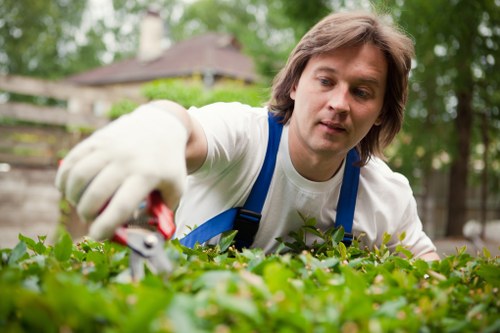
The climate in Rotherhithe plays a significant role in determining the types of plants that will thrive in your garden. Situated along the River Thames, Rotherhithe experiences a temperate maritime climate, characterized by mild winters and cool summers.
Understanding the local climate helps in selecting plants that are well-suited to the environment, reducing the need for excessive maintenance. Plants that are native to the region or adapted to similar conditions are generally more resilient and require less water and care.
Additionally, the proximity to the river can influence factors like humidity and soil moisture, which are crucial considerations in garden planning and maintenance.
Essential Tools for Garden Maintenance
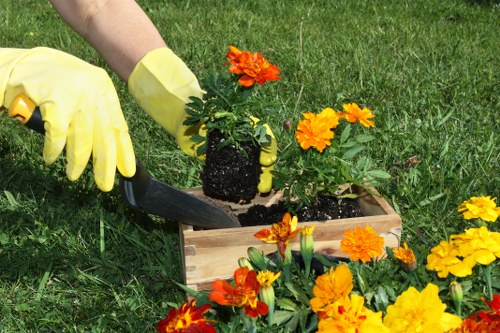
Having the right tools is paramount for effective garden maintenance. Here are some essential tools that every gardener in Rotherhithe should consider:
- Pruning Shears: Ideal for trimming and shaping plants.
- Garden Fork: Useful for aerating the soil and removing weeds.
- Watering Can or Hose: Ensures your plants receive adequate moisture.
- Gloves: Protect your hands while working in the garden.
- Lawn Mower: Keeps your lawn neat and well-maintained.
Investing in quality tools not only makes maintenance easier but also enhances the longevity of your gardening equipment.
Seasonal Garden Maintenance Tips
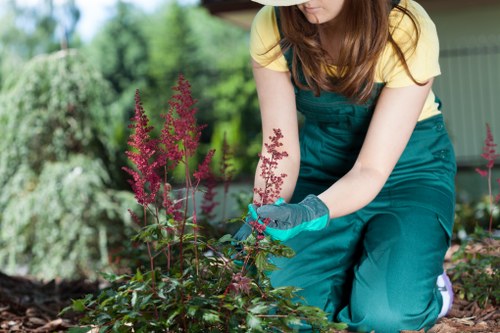
Effective garden maintenance involves adapting your care routine to the changing seasons. Here's a breakdown of seasonal tasks:
Spring
Spring is the perfect time to revitalize your garden. Focus on planting new flowers, fertilizing the soil, and pruning overgrown shrubs.
Summer
During summer, prioritize regular watering, especially for newly planted areas. Keep an eye out for pests and diseases that can affect your plants.
Autumn
Autumn is ideal for clearing fallen leaves, preparing beds for winter, and planting bulbs that will bloom in the spring.
Winter
In winter, protect sensitive plants from frost, mulch garden beds, and perform any necessary repairs to garden structures.
Choosing the Right Plants for Rotherhithe Gardens

Selecting the right plants is crucial for a sustainable and low-maintenance garden. Consider factors such as sunlight, soil type, and water availability when choosing plants.
Some popular choices for Rotherhithe gardens include:
- Roses: Known for their beauty and fragrance.
- Lavender: Adds color and deters pests.
- Hostas: Ideal for shade areas.
- Boxwood: Perfect for creating hedges and borders.
- Ornamental Grasses: Adds texture and movement to the garden.
By choosing plants that are well-suited to the Rotherhithe climate, you reduce the need for intensive care and ensure your garden remains vibrant year-round.
Soil Health and Fertilization
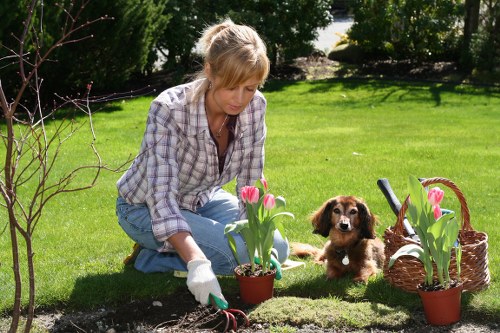
Healthy soil is the foundation of a thriving garden. Regularly testing your soil can help determine its pH level and nutrient content, allowing you to make informed decisions about fertilization and amendments.
Organic compost is an excellent way to enhance soil fertility and structure. It improves water retention, encourages beneficial microbial activity, and provides essential nutrients for plant growth.
Applying mulch around plants helps retain moisture, regulate soil temperature, and suppress weed growth, contributing to overall soil health.
Watering Practices for a Healthy Garden

Proper watering is essential for maintaining a healthy garden. Overwatering can lead to root rot and other issues, while underwatering can stress plants and inhibit growth.
Consider installing an irrigation system to ensure consistent and efficient watering. Drip irrigation is particularly effective as it delivers water directly to the plant roots, minimizing evaporation and waste.
Watering in the early morning or late evening reduces water loss due to evaporation and allows plants to absorb moisture more effectively.
Pest and Disease Management

Managing pests and diseases is a critical aspect of garden maintenance. Regularly inspect your plants for signs of infestation or illness, such as discolored leaves, wilting, or visible pests.
Implementing integrated pest management (IPM) strategies can help control pest populations without relying heavily on chemicals. This includes encouraging beneficial insects, using natural repellents, and practicing crop rotation.
Maintaining good garden hygiene by removing dead plant material and weeds can also reduce the risk of pests and diseases taking hold.
Pruning and Trimming Techniques
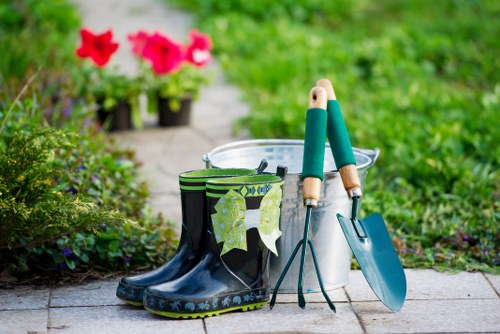
Regular pruning and trimming keep plants healthy and promote optimal growth. Proper pruning techniques vary depending on the type of plant and the desired outcome.
Pruning helps remove dead or diseased branches, improves air circulation, and shapes plants for better aesthetics and productivity.
Using sharp and clean tools ensures clean cuts, which minimizes the risk of introducing diseases to your plants.
Lawn Care and Maintenance
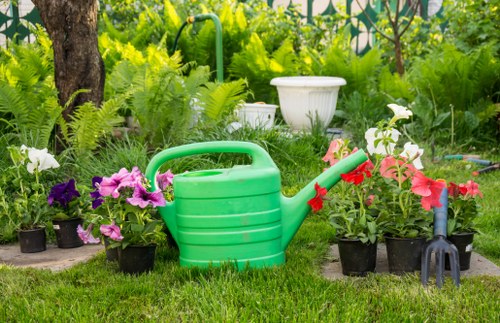
A well-maintained lawn enhances the overall appearance of your garden. Regular mowing, aeration, and fertilization are key components of effective lawn care.
Mowing at the right height encourages strong root growth and helps prevent weed establishment. Typically, a lawn should be cut to a height of 2.5 to 3 inches.
Aerating the soil allows air, water, and nutrients to penetrate the grass roots, promoting healthier and more resilient turf.
Hardscaping and Garden Structures
[IMG_11]Incorporating hardscaping elements like pathways, patios, and pergolas can add functionality and aesthetic appeal to your garden. These structures not only provide practical benefits but also serve as focal points that enhance the overall design.
When planning hardscaping, consider materials that complement your garden's style and are durable enough to withstand the local weather conditions in Rotherhithe.
Proper installation and maintenance of garden structures ensure they remain safe and attractive for years to come.
Eco-Friendly Garden Maintenance Practices
[IMG_12]Adopting eco-friendly practices in garden maintenance benefits both your garden and the environment. Here are some sustainable approaches:
- Composting: Recycle organic waste to create nutrient-rich compost for your plants.
- Rainwater Harvesting: Collect and use rainwater for irrigation, reducing reliance on tap water.
- Native Plants: Choose plants native to the area, as they require less water and are more resistant to local pests.
- Natural Fertilizers: Use organic fertilizers to minimize chemical runoff and soil degradation.
- Mulching: Helps retain soil moisture and reduces the need for frequent watering.
Implementing these practices not only promotes a healthier garden but also contributes to environmental conservation efforts in Rotherhithe.
Hiring Professional Garden Maintenance Services
[IMG_13]While many garden maintenance tasks can be handled by homeowners, hiring professional services can provide expertise and save time. Professional gardeners in Rotherhithe offer a range of services, including:
- Comprehensive garden planning and design.
- Regular maintenance tasks like pruning, mowing, and weeding.
- Pest and disease management solutions.
- Installation and maintenance of irrigation systems.
- Hardscaping and landscaping services.
By partnering with professionals, you can ensure your garden receives the care it needs to flourish, allowing you to enjoy a beautiful outdoor space without the hassle.
DIY Garden Maintenance Tips
[IMG_14]For those who prefer a hands-on approach, here are some DIY garden maintenance tips:
- Regular Weeding: Keep your garden beds free from weeds to reduce competition for nutrients and water.
- Deadheading: Removing spent flowers encourages new blooms.
- Soil Testing: Periodically test your soil to ensure it has the right pH and nutrient levels.
- Proper Tool Care: Clean and store your tools properly to extend their lifespan.
- Plant Rotation: Change the location of plant families each season to prevent soil depletion and reduce pest buildup.
Implementing these tips can help you maintain a healthy and attractive garden with minimal effort.
Conclusion: Achieving a Beautiful Garden in Rotherhithe
[IMG_15]Maintaining a stunning garden in Rotherhithe is a rewarding endeavor that enhances the beauty and value of your home. By understanding the local climate, investing in the right tools, and adopting effective maintenance practices, you can create a vibrant and thriving outdoor space.
Whether you choose to handle garden maintenance yourself or hire professional services, the key is consistency and care. With dedication and the right strategies, your garden can be a source of pride and enjoyment for years to come.
Contact us today to learn more about our garden maintenance services in Rotherhithe and transform your garden into a lush, beautiful haven.